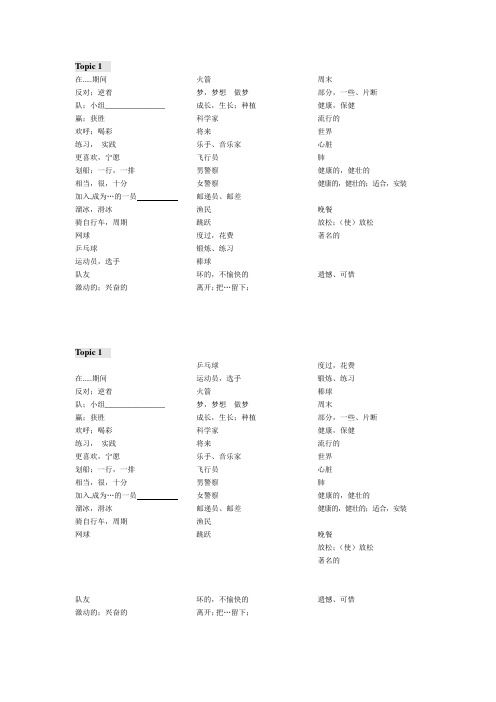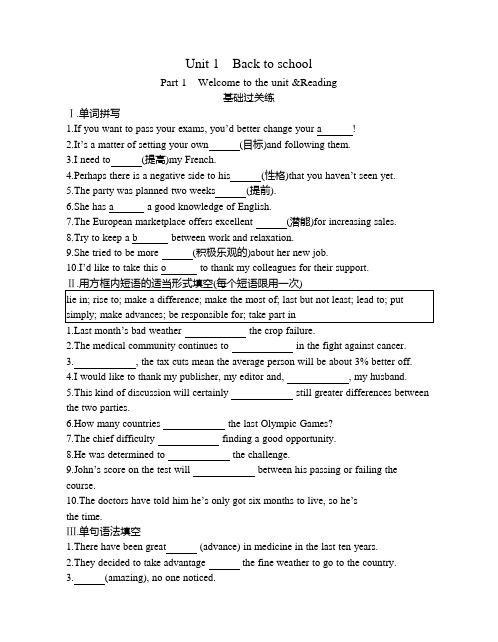Topic A (Ch 1, Week1) (2)
- 格式:ppt
- 大小:146.00 KB
- 文档页数:30


国开(中央电大)专科《商务英语2》形考任务(单元自测1至8)试题及答案国开(中央电大)专科《商务英语2》形考任务(单元自测1至8)试题及答案 (电大网上形考必备资料) 说明:课程代码:04010。
适用专业及层次:电子商务、物流管理专科。
平台考试网址:http://。
单元自测 1 试题及答案题目顺序是随机的,使用查找功能(Ctrl+F)进行搜索 [题目]—As you know, I’m not quite familiar with how to shoponline. —It’s a piece of cake! I’ll show you how to do it. [答案]First of all, you should find a good e-commerce site. [题目]Consumers can’t digest too much information on a web page, resulting______ low rates of return. [答案] in [题目]—Great! Maybe from now on,I should try to buy goods online. —________________. [答案] Why not?Go ahead. Just give it a try. [题目]I know personal selling is also avery effective tool for building ______buyers’ confidence. [答案] up [题目]—I think we can use two or more kinds of media together in anadvertising campaign. —________________. [答案]That’s quite right. Wecan attract more people. [题目]In China, Taobao is one of _______e-commerce sites. [答案] the most popular [题目]In my opinion, the firstthing _______ is what tools we should use. (考点:不定式结构的用法) [答案] to be discussed [题目]It can be aimed _______ individuals with selectsurfing behavior. [答案] at [题目]—Morning, Daniel. Today I’d like todiscuss the promotional events of our products with you.—________________. [答案] Ok. I think we should draw up a thorough plan,first. [题目]—Uh, I think online shopping is very time-consuming.—________________. [答案]I somewhat agree with you, but not completely.二、翻译:从以下A、B、C三个选项中选出与英文最适合的中文翻译。


Topic 1在.....期间_______________ 反对;逆着______________ 队;小组________________赢;获胜________________ 欢呼;喝彩_____________ 练习,实践_____________ 更喜欢,宁愿____________ 划船;一行,一排_________ 相当,很,十分___________ 加入,成为…的一员溜冰,滑冰_____________骑自行车,周期__________ 网球_____________乒乓球_____________运动员,选手____________ 火箭___________________梦,梦想做梦__________成长,生长;种植_________科学家_____________将来_____________乐手、音乐家___________飞行员_____________男警察_____________女警察_____________邮递员、邮差____________渔民_____________跳跃_____________度过,花费_____________锻炼、练习_____________棒球_____________周末_____________部分,一些、片断_________健康,保健_____________流行的_____________世界_____________心脏_____________肺_____________健康的,健壮的__________健康的,健壮的;适合,安装_____________晚餐_____________放松;(使)放松__________著名的_____________队友_____________激动的;兴奋的_____________ 坏的,不愉快的_____________离开;把…留下;_____________遗憾、可惜_____________Topic 1在.....期间_______________ 反对;逆着______________ 队;小组________________赢;获胜________________ 欢呼;喝彩_____________ 练习,实践_____________ 更喜欢,宁愿____________ 划船;一行,一排_________ 相当,很,十分___________ 加入,成为…的一员溜冰,滑冰_____________骑自行车,周期__________ 网球_____________ 乒乓球_____________运动员,选手____________火箭___________________梦,梦想做梦__________成长,生长;种植_________科学家_____________将来_____________乐手、音乐家___________飞行员_____________男警察_____________女警察_____________邮递员、邮差____________渔民_____________跳跃_____________度过,花费_____________锻炼、练习_____________棒球_____________周末_____________部分,一些、片断_________健康,保健_____________流行的_____________世界_____________心脏_____________肺_____________健康的,健壮的__________健康的,健壮的;适合,安装_____________晚餐_____________放松;(使)放松__________著名的_____________队友_____________激动的;兴奋的_____________ 坏的,不愉快的_____________离开;把…留下;_____________遗憾、可惜_____________。

topic的用法及短语"topic"是一个常用的英语词汇,可以用作名词或动词。
下面我将从不同角度介绍"topic"的用法及相关短语。
1. 名词用法:"Topic"可以指一个讨论、研究或谈论的主题或话题。
例如,"The topic of today's meeting is project updates."(今天会议的主题是项目进展。
)。
"Topic"也可以指一篇文章、演讲或讨论的主题。
例如,"The professor gave a lecture on the topic of climate change."(教授就气候变化这一主题进行了讲座。
)。
"Topic"还可以指一个人感兴趣或专长的领域。
例如,"She is an expert in the topic of artificial intelligence."(她是人工智能领域的专家。
)。
2. 动词用法:"Topic"作为动词,意为提及或讨论某个特定的主题。
例如,"The speaker will topic the importance of teamwork in the workplace."(演讲者将讨论工作场所中团队合作的重要性。
)。
以下是一些与"topic"相关的常用短语:"Discuss a topic",讨论一个话题。
"Choose/select a topic",选择一个主题。
"Introduce a topic",引入一个话题。
"Explore a topic",探索一个主题。
"Delve into a topic",深入研究一个话题。

Unit1Back to schoolPart1Welcome to the unit&Reading基础过关练Ⅰ.单词拼写1.If you want to pass your exams,you’d better change your a!2.It’s a matter of setting your own(目标)and following them.3.I need to(提高)my French.4.Perhaps there is a negative side to his(性格)that you haven’t seen yet.5.The party was planned two weeks(提前).6.She has a a good knowledge of English.7.The European marketplace offers excellent(潜能)for increasing sales.8.Try to keep a b between work and relaxation.9.She tried to be more(积极乐观的)about her new job.10.I’d like to take this o to thank my colleagues for their support.st month’s bad weather the crop failure.2.The medical community continues to in the fight against cancer.3.,the tax cuts mean the average person will be about3%better off.4.I would like to thank my publisher,my editor and,,my husband.5.This kind of discussion will certainly still greater differences between the two parties.6.How many countries the last Olympic Games?7.The chief difficulty finding a good opportunity.8.He was determined to the challenge.9.John’s score on the test will between his passing or failing the course.10.The doctors have told him he’s only got six months to live,so he’sthe time.Ⅲ.单句语法填空1.There have been great(advance)in medicine in the last ten years.2.They decided to take advantage the fine weather to go to the country.3.(amazing),no one noticed.4.The teacher wants the children to feel(confidence)about asking questions when they don’t understand.5.She determined that she would be equal any test the corporation put her to.6.I don’t feel ready to take on these new(responsible).7.Mike found a(challenge)job as a computer programmer.8.Here(come)a good chance that you can use your summer vacation to go on study tours.9.Your problem lies lacking efficient methods.10.Jim couldn’t wait(turn)on the TV when he got home.Ⅳ.完成句子1.这个会议非常重要。
【根底知识稳固】U1T2SA1 get lost 走失,迷路。
其中lost为形容词,其近义词有missing和gone。
e.g. I found my bike missing.我发现我的自行车丢了。
My pen is lost. 我的笔丢了。
2 call up给……打,名词作宾语时可以放在up后面或两词之间;宾语是代词时,必须放在两词之间。
e.g. I called Tom up yesterday, but he didn’t answer it.昨天我给汤姆打,但他没有接。
I’ll call you up as soon as I come back.我一回来就给你打。
同义词组:ring up, make a telephone call。
3 already常用于肯定句中,指动作已经发生,或比期望发生的要早,一般用在句子中间或句末;yet用于疑问句和否认句中,议论尚未发生但可能发生的事,通常位于句末。
e.g. —Have you had your lunch yet? 你吃过午饭了吗?—Yes, I’ve already had it.是的,我已经吃过了。
U1T2SB1 population意为“人口〞,“居民〞,常用形容词large或small来表示人口的多少。
e.g. China has the largest population in the world.中国拥有世界上最多的人口。
注: 常用句式:What’s the population of...? 意为“……人口是多少?〞have a pupulation of... 意为“有……人口〞e.g. China has a pupulation of 1.3billion. 中国有13亿人口。
2 increase v. (使)增加,〔使)增大,增多。
increase by+倍数或百分数,表示“增加了……倍或百分之……〞。
e.g. Compared with last year, our pay has increased by three times.与去年相比,我们的工资增长了3倍。
毛额市鹌鹑阳光实验学校话题21 热点话题(Topical issues)Ⅰ.话题相关词汇1.世界人口爆炸world population explosion2.人口控制population/birth control3.世界人口日World Population Day4.独生子女政策the one child policy5.导致,引起contribute/lead to6.最近的,跟上时代的up to date/update/latest7.网上冲浪surf the Internet8.网上购物shopping online9.网民netizen (net citizen)10.网吧Internet bar11.网友net friend12.外出打工人员migrant workers13.素质教育education for allround development14.应试教育examoriented education15.学生减负to reduce study load16.废气排放gas emission17.financial crisis18.和谐社会harmonious society19.环境保护environmental protection20.广泛关注wide public concern21.降低人口出生率reduce the birth rate22.健康问题health problem23.二孩政策the second child policy或twochild policy24.住房问题housing problem25.公平公正fair and equal/fair and just26.新鲜血液new blood/fresh blood27.开阔视野widen horizenⅡ.实用句型1.农民进城打工日益增长的趋势,引起世界上大部分城市的普遍关注。
topic1 话题1的英文简写英文回答:Summary:Topic1 is a comprehensive term that encompasses a wide range of subtopics. Its scope includes the study of various aspects of human behavior, including cognition, emotion, and motivation. Research in this field aims to understand the factors that influence how people think, feel, and act.Key Areas of Research:Cognitive Psychology: Explores the mental processes involved in acquiring, storing, and retrieving information. Areas of interest include attention, memory, language, and problem-solving.Developmental Psychology: Examines how individuals change and develop throughout their lifespan, from infancyto old age. Focuses on cognitive, emotional, and social development.Social Psychology: Investigates the influence of social factors on individual behavior and attitudes. Examines topics such as conformity, obedience, and prejudice.Personality Psychology: Seeks to identify and measure the stable characteristics that distinguish individuals from one another. Traits, motives, and temperaments are commonly studied.Abnormal Psychology: Examines psychological disorders, including their causes, symptoms, and treatments. Includes areas such as anxiety, depression, and schizophrenia.Neuropsychology: Combines psychology with neuroscience to study the relationship between brain structure and function and their impact on behavior.Positive Psychology: Focuses on the strengths and virtues that contribute to well-being and happiness.Explores topics such as gratitude, resilience, and optimism.Methodologies and Tools:Research in topic1 relies on a variety of methodologies, including:Observational studies.Experimental designs.Case studies.Psychometric testing.Neuroimaging techniques.By utilizing these methods, psychologists aim tocollect data, test hypotheses, and draw conclusions about human behavior.Applications:Findings from topic1 research have practical applications in various settings, such as:Education: Designing effective teaching methods and interventions.Healthcare: Improving mental health treatments and promoting well-being.Workplace: Enhancing employee motivation and productivity.Policymaking: Informing decisions on issues related to human behavior.Conclusion:Topic1 is a dynamic and interdisciplinary field that provides valuable insights into the complexities of human behavior. Through ongoing research, psychologists continue to expand our understanding of ourselves and contribute tothe improvement of human life.中文回答:话题1概述:话题1是一个涵盖广泛子主题的综合术语。